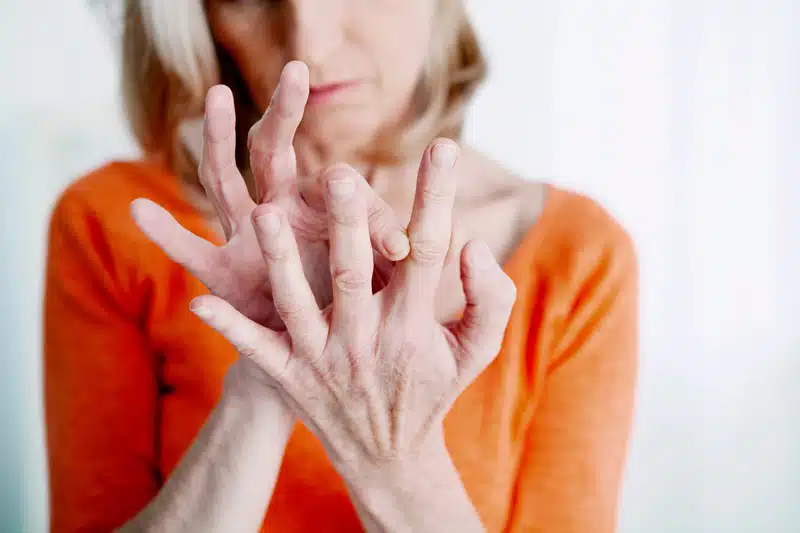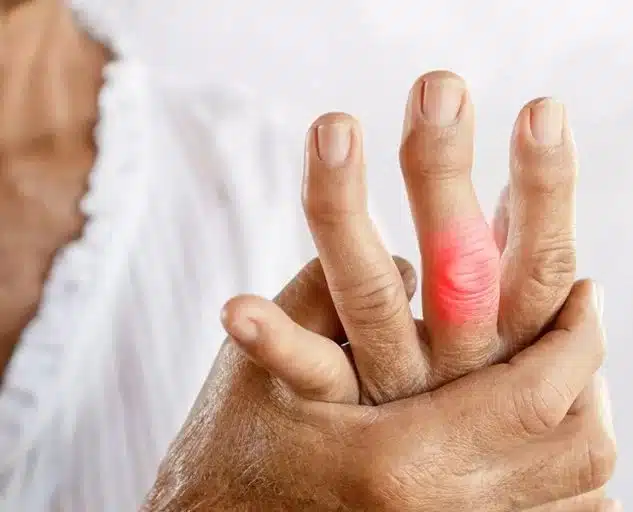This website uses cookies so that we can provide you with the best user experience possible. Cookie information is stored in your browser and performs functions such as recognising you when you return to our website and helping our team to understand which sections of the website you find most interesting and useful.
Finger - Hand Joint Replacement
Fair Oaks Orthopedics - Fairfax VA
Stephen W. Pournaras, Jr., MD
FINGER JOINT REPLACEMENT (Arthroplasty)
Finger joint replacement removes damaged or worn joints from your fingers and replaces them with artificial ones.
Finger joint replacement is also called an arthroplasty. This type of surgery is mostly recommended in cases of arthritis but may sometimes be helpful for other causes of joint damage such as injury or trauma.
The two types of finger joint replacement surgeries are:
Metacarpophalangeal (MCP) joint replacement: Dr. Pournaras will replace the affected joint through the knuckle. This technique may be used to treat conditions like rheumatoid arthritis (RA).
Proximal interphalangeal (PIP) joint replacement: This procedure is done on the middle portion of your finger between your knuckle and fingernail, and it is the more common option for treating osteoarthritis (OA).


HAND JOINT REPLACEMENT is used in cases of severe hand arthritis. The procedure replaces a joint that has been destroyed by arthritis with an artificial joint. This artificial joint may be made of metal, plastic, silicone rubber, or your own body tissue, such as a tendon.
If you suffer from hand arthritis, the two main surgical options when non-surgical treatments fail are fusion (arthrodesis) and total knuckle replacement (arthroplasty).
Hand joint replacement surgery removes the joint structures and replaces them with new parts. This procedure is used when your hand or finger joints are damaged, injured, or in a lot of pain due to the different types of arthritis.
Call Us Today To Make An Appointment.
Frequently Asked Questions About Hand Joint Replacement
What Causes Joint Inflammation In The Hand And Fingers?
Joint inflammation in the hands and fingers can be caused by reasons including:
Rheumatoid arthritis (RA): RA is an autoimmune disease where your body’s immune system attacks its own synovium (the lining of your joints), leading to inflammation, pain, swelling, and eventually joint damage. RA commonly affects the small joints of the hands and fingers, causing stiffness, deformity, and loss of movement.
Osteoarthritis (OA): OA, also known as degenerative joint disease, occurs due to the breakdown of cartilage in your joints over time, leading to inflammation, pain, and stiffness. OA can affect the joints of the hands and fingers, particularly those that are subject to repetitive use or injury.
Psoriatic arthritis: Psoriatic arthritis is a type of inflammatory arthritis that can affect patients with psoriasis, a chronic skin condition. It causes inflammation in the joints of your hands and fingers, as well as other joints, leading to pain, swelling, stiffness, and potential joint damage.
Gout: is a type of arthritis caused by the buildup of uric acid crystals in your joints, leading to inflammation and pain. Gout most commonly affects the joint at the base of your big toe, but it can also affect the joints in your hands and fingers, causing swelling, redness, and intense pain.
Lupus arthritis: Systemic lupus erythematosus (SLE) is an autoimmune disease that can affect multiple organs and tissues, including the joints. Lupus arthritis can cause inflammation in the joints of your hands and fingers, leading to pain, swelling, and stiffness.
Infectious arthritis: Bacterial, viral, or fungal infections can cause infectious arthritis, also known as septic arthritis. Infections can occur in any joint, including those in your hands and fingers, leading to inflammation, pain, swelling, and joint damage.
Trauma or injury: Joint injuries, fractures, dislocations, or repetitive stress injuries to your hands and fingers can cause inflammation in the affected joints, leading to pain, swelling, and stiffness.
Other inflammatory conditions: Conditions such as Sjögren’s syndrome can also cause joint inflammation in the hands and fingers, along with other joints in the body.
Joint inflammation in the hands and fingers can result from a variety of causes, including autoimmune diseases, degenerative changes, infections, trauma, and other inflammatory conditions.
The purpose of joint replacement surgery is to reduce the pain in your hand, and after this procedure, you may experience temporary swelling, bruising, and pain. Temporary pain meaning when your body is adjusting to the new joint and as tissues around it heal.
Most of the post-op pain you may experience should fully be gone within a few months. If you still are having severe pain, Call our office immediately, and Dr. Pournaras may also prescribe pain relievers on a short-term basis.
Patients Who Consider Hand or Finger Joint Replacement
Patients who decide to have hand or finger joint replacement surgery (arthroplasty) are generally older and suffer from the painful effects of osteoarthritis or rheumatoid arthritis.
The inflammation that osteoarthritis causes, generally results from the breakdown of the cartilage in a joint, while rheumatoid arthritis attacks the synovial membranes that lubricate the joint. This can create symptoms such as:
- Pain
- Swelling
- Stiffness
- Tenderness
When non-surgical treatments do not work, surgery then becomes an option.
Yes, there is a difference between finger joint replacement and hand joint replacement surgery as to which joints are being replaced and the extent of the surgical procedure.
Finger Joint Replacement Surgery:
Purpose: Finger joint replacement surgery (arthroplasty) replaces a damaged or arthritic joint in your finger with an artificial joint implant.
Indications: This surgery is for severe arthritis or joint damage in specific finger joints, such as the proximal interphalangeal (PIP) joint or the metacarpophalangeal (MCP) joint.
Procedure: During finger joint replacement surgery, the damaged or arthritic joint is removed, and an artificial joint implant made of metal, plastic, or silicone and is inserted to restore function and alleviate pain.
Recovery: Recovery from finger joint replacement surgery may involve physical therapy, splinting, and rehabilitation exercises to regain strength, mobility, and function in your finger.
Hand Joint Replacement Surgery:
Purpose: Hand joint replacement surgery replaces one or more joints in your hand, which may include the fingers, thumb, or wrist, with artificial joint implants.
Indications: Hand joint replacement surgery is used for more severe arthritis or joint damage affecting multiple joints in the hand, including the fingers, thumb, and wrist.
Procedure: Hand joint replacement is similar to that of finger joint replacement, but it involves replacing multiple joints within your hand, such as the MCP, PIP, and distal interphalangeal (DIP) joints, as well as the carpometacarpal (CMC) joint of the thumb.
Recovery: Recovery from hand joint replacement surgery has a longer recovery time than finger joint replacement, as it addresses multiple joints and a larger area of your hand.
While both finger joint replacement and hand joint replacement surgery replace damaged joints with artificial implants, finger joint replacement surgery focuses on individual finger joints. In contrast, hand joint replacement surgery addresses multiple joints within your hand, including the fingers, thumb, and wrist. The specific choice of surgical procedure depends on the extent and location of the joint damage.
Finger and hand replacement surgeries involve replacing damaged or diseased joints with artificial implants to restore function, alleviate pain, and improve quality of life. There are several types of finger and hand replacement surgeries, each designed to address specific joints and conditions.
Finger Joint Replacement Surgery:
Proximal Interphalangeal (PIP) Joint Replacement: This surgery replaces the joint at the middle of the finger (between the proximal and middle phalanges) with an artificial implant.
Distal Interphalangeal (DIP) Joint Replacement: Replacement of the joint at the end of the finger (distal phalanx).
Metacarpophalangeal (MCP) Joint Replacement: Surgery to replace the joint at the base of the finger (where the finger meets the palm).
Silicone Arthroplasty: In this procedure, silicone implants are used to replace damaged finger joints, particularly in cases of severe arthritis or deformity.
Thumb Joint Replacement Surgery:
Carpometacarpal (CMC) Joint Replacement: Surgery to replace the joint at the base of the thumb (where the thumb meets the wrist).
Interphalangeal (IP) Joint Replacement: Replacement of the joint at the middle or end of the thumb.
Hand Joint Replacement Surgery:
Total Wrist Replacement: Surgery to replace the entire wrist joint with an artificial implant. This procedure is less common and typically reserved for severe cases of wrist arthritis.
Partial Wrist Replacement: In this procedure, only a portion of the wrist joint is replaced with an implant, preserving some of the natural joint structures.
Total Joint Replacement (TJR) of the Hand: Total joint replacement surgery for the hand may involve replacing multiple joints within the hand, including the fingers, thumb, and wrist, with artificial implants.
Silicone Joint Arthroplasty:
Silicone MCP Joint Arthroplasty: This procedure uses silicone implants to replace damaged or arthritic MCP joints in the fingers.
Silicone PIP Joint Arthroplasty: Replacement of the PIP joint with silicone implants.
Surgical Fusion (Arthrodesis): In some cases, surgical fusion is performed to stabilize a joint that is severely damaged or unstable. Removing the joint surfaces and fusing the bones together with screws, plates, or other fixation devices is also part of this procedure.
The specific type of finger or hand replacement surgery recommended for you will depend on factors such as the location and severity of joint damage, your overall health and activity level, and the treatment goals.
On your surgery day, here’s what to expect:
Preoperative Preparations:
Upon arrival, you will check-in and have a pre-op exam that includes vital sign measurements, a medical history review, and possibly additional tests such as blood tests or x-rays.
Anesthesia Administration:
Before the surgery begins, anesthesia will be given, ensuring you are comfortable and pain-free throughout the procedure.
The type of anesthesia used will depend on the specific surgical procedure and your medical history and preferences. Options may include local anesthesia, regional anesthesia (such as nerve blocks), or general anesthesia.
Surgical Procedure:
Dr. Pournaras will make incisions to access the affected joint(s) in the finger or hand and perform the required surgical interventions, such as removing damaged joint surfaces, preparing the bone, and implanting prosthetic joint components.
Postoperative Recovery:
- After the surgery, you will be transferred to a recovery area, where you will be closely monitored.
- You may experience some pain or grogginess immediately after the surgery, which can be managed with pain medications and supportive care.
- Our medical team will provide instructions on postoperative care, including wound care, activity restrictions, and follow-up appointments.
ORTHOPEDIC CARE IN FAIRFAX, VA
At Fair Oaks Ortho, we believe that cost shouldn’t be an obstacle to highest-quality care available. That’s why we’re proud to accept insurance from most major providers in the state of Virginia. View our list of accepted medical providers, and don’t hesitate to reach out to our staff with any questions.









Make Your Appointment Today
Fair Oaks Ortho – Fairfax,VA

FAIR OAKS ORTHOPEDICS
3998 Fair Ridge Dr., Suite 100 Fairfax, Va 22033
Get Directions
Hours:
Mon 8:00 am – 4:30 pm
Tue 8:00 am – 4:30 pm
Wed 8:00 am – 4:30 pm
Thu 8:00 am – 4:30 pm
Fri 8:00 am – 4:30 pm
Sat Closed
Sun Closed

